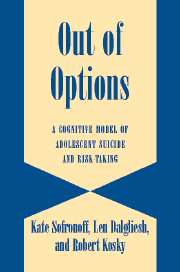Book contents
- Frontmatter
- Contents
- Preface
- Introduction
- 1 Adolescent Suicide: An Overview of the Epidemiology
- 2 Risk and Predisposing Factors in Adolescent Suicide
- 3 Emotional Problems and Adolescent Suicide
- 4 Adolescent Suicide: Cognitive Variables
- ADOLESCENT RISK-TAKING
- A MODEL OF SUICIDE AND RISK-TAKING
- AN EVALUATION OF THE S/RT MODEL
- IMPLICATIONS FOR TREATMENT
- 12 Clinical Implications: The Development of Problem Solving
- 13 Clinical Implications: Intervention and Resilience Building
- References
- Index
12 - Clinical Implications: The Development of Problem Solving
from IMPLICATIONS FOR TREATMENT
Published online by Cambridge University Press: 03 September 2009
- Frontmatter
- Contents
- Preface
- Introduction
- 1 Adolescent Suicide: An Overview of the Epidemiology
- 2 Risk and Predisposing Factors in Adolescent Suicide
- 3 Emotional Problems and Adolescent Suicide
- 4 Adolescent Suicide: Cognitive Variables
- ADOLESCENT RISK-TAKING
- A MODEL OF SUICIDE AND RISK-TAKING
- AN EVALUATION OF THE S/RT MODEL
- IMPLICATIONS FOR TREATMENT
- 12 Clinical Implications: The Development of Problem Solving
- 13 Clinical Implications: Intervention and Resilience Building
- References
- Index
Summary
So far, we can summarize our findings as follows: We found that both suicidal and risk-taking young people demonstrated cognitive deficits. In meeting challenging problems, they generated only a narrow range of options as possible solutions and their capacity to develop alternative solutions was impaired. Furthermore, the options they did generate were likely to be irrelevant for the solution of the problem or were likely to be aggressive responses to the challenge. Neither suicidal nor serious risk-taking adolescents seemed to care about the consequences of the choices they made. Risk takers were more influenced by their perception of likely reactions from their peers and suicidal adolescents were not protected by beliefs that life had value.
Suicidal adolescents demonstrated less confidence in their ability to solve problems correctly or in the likely success of the solutions they generated than either risk takers or asymptomatic adolescents. In fact, when put to the test, they were less able to solve hypothetical problems than were normal adolescents. They lacked the skills and strategies required to reach workable solutions.
Such cognitive deficits in adolescents may make them vulnerable to developing a single all-encompassing solution when they are dealing with a challenging problem. Their solution may not be an adaptive one. Suicide, as a simple solution, becomes a possibility when the individual fails to generate other solutions or when the individual does not have confidence that any other solution is workable.
Risk-taking adolescents also showed deficits in their ability to generate solutions.
Information
- Type
- Chapter
- Information
- Out of OptionsA Cognitive Model of Adolescent Suicide and Risk-Taking, pp. 155 - 164Publisher: Cambridge University PressPrint publication year: 2004
